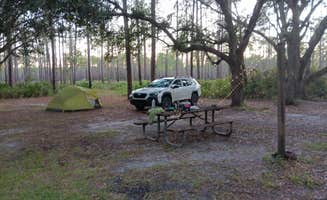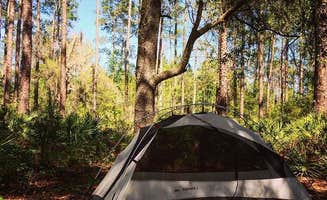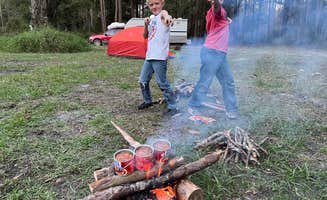Osceola National Forest offers multiple primitive camping near Jasper, Florida throughout its 200,000 acres of pine flatwoods and cypress swamps. The forest contains several hunt camps that provide free dispersed camping options with varying levels of amenities. Winter temperatures typically range from 40-70°F, making December through March the most comfortable camping season.
What to do
Forest exploration: Several hiking trails wind through Osceola National Forest, providing opportunities to spot wildlife and native flora. The Florida Trail crosses through sections of the forest with access points near camping areas. According to a camper at 17 Mile Hunt Camp, "We got an amazing spot with a view of the pond."
Disconnected relaxation: Limited cell service creates an opportunity to truly unplug. A visitor notes, "Not much cell service, no tv stations, I brought movies, really enjoyed myself." The forest's remote location means minimal light pollution for excellent stargazing opportunities on clear nights.
Fishing opportunities: Small ponds throughout the forest offer fishing options. At Sandhill Hunt Camp, nearby water bodies contain various fish species. One camper mentioned, "Nearby clean pond too," when describing the 17 Mile Hunt Camp area.
What campers like
Privacy and space: Campers consistently mention the ample space between sites. A visitor to Cobb Hunt Camp noted, "Free no water or electricity, porta-potties. Most campers stay to themselves and there's room for privacy." The dispersed nature of these sites allows campers to find secluded spots.
Peaceful environment: The relative remoteness creates a quiet camping experience. One reviewer shared, "It was really peaceful. There were only a few other people there and we hardly ever saw them." This makes these locations ideal for those seeking solitude.
Low-cost camping: The free camping options attract budget-conscious travelers. A camper explained, "Has the feel of a regular campground but its free. Lots of wide open area where if you have a trailer you can park."
What you should know
Access road conditions: Many camp areas have rough access roads that can become problematic after rain. A visitor to 17 Mile Hunt Camp cautioned, "The roads are a little rough, yet passable, it was a little wet because of rain a day earlier." Another noted, "Very muddy, could get stuck."
Seasonal amenities: Facilities vary by season, with hunting seasons typically offering more services. A camper mentioned, "During hunting season, there are portable toilets, but no water. Picnic tables at various spots and plenty of shady areas."
Campground closures: Temporary closures can occur without online notification. One camper reported, "We arrived late and saw the campground was taped off and a sign read closed indefinitely. However, we drove just past the campground and found many others camped on the side of the road."
Tips for camping with families
Wildlife awareness: The forest contains various wildlife that requires appropriate caution with children. A camper at West Tower Hunt Camp advised, "We did have to be extra careful with our little dog though because we did get the sense that something could try to eat it since the sites are in the middle of the woods."
Book exchange: Some locations offer unexpected amenities for family entertainment. A reviewer noted, "Also available is a bathroom and an outdoor cold shower. There is a book exchange in the bathroom."
Camp host assistance: Certain sites have on-site hosts who can provide information and assistance. A visitor reported, "Host was very nice. Bathroom and shower but no hot water." Another mentioned, "Having a host with no charge threw me for a bit of a loop."
Tips from RVers
Ground assessment: The forest's sandy soil can create challenges for larger vehicles. An RV camper at West Tower Hunt Camp advised, "Just make sure to check the ground before you park. Very muddy, could get stuck."
Site selection strategy: RVers should scout locations before setting up. One camper with a 26-foot travel trailer explained, "We did a few loops looking for a good site. It was pretty easy to see where the areas for camping are but it's not as clear as a paid RV park. We were able to pull through instead of backing in."
Leveling requirements: Some sites offer naturally flat terrain that requires minimal setup. An RVer shared, "We didn't even need to level the camper - it was naturally flat," which can save considerable setup time for larger vehicles.




